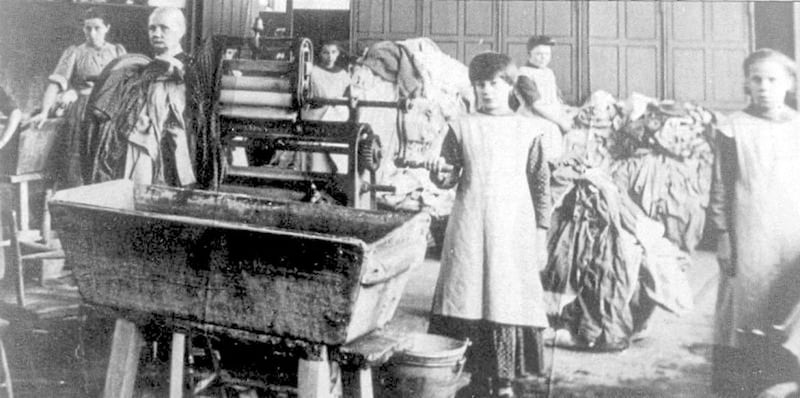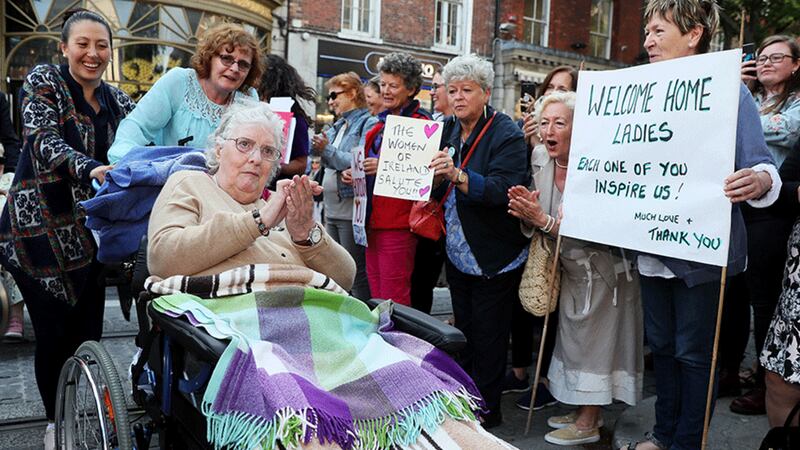THE president of Ireland has apologised to women who were forced to work in Magdalene laundries after they were "failed" by the state and religious orders in a "very dark" period of the country's history.
In a speech to hundreds of women who arrived at his official residence Aras an Uachtarain in Dublin on Tuesday afternoon, Michael D Higgins said stories of "forced labour and injustice" had left a "deep stain" on society.
Accompanied by his wife Sabina, he hosted a drinks reception for crowds of women who travelled from around the world to speak out about their treatment when they were incarcerated in the institutions when young.
Unmarried mothers, girls considered troublesome or wayward and those with learning difficulties were kept in the laundries run by nuns and made to carry out unpaid manual labour.
More than 10,000 women are thought to have passed through the laundries in the Republic of Ireland between 1922 and 1996.
What amazing scenes here at the Mansion House as the first group of Magdalene ladies arrive for a gala dinner as part of their special homecoming #DublinHonoursMagdalenes pic.twitter.com/fFfm7q9dsX
— Miriam Donohoe (@miriamdonohoe) June 5, 2018
Describing them as "inspiring", President Higgins said: "I apologise to you, survivors of the Magdalene regime," and said he hoped the visit was a chance to "heal" and "come into the light from the darkness".
There were cheers, tears and applause as coach after coach of women arrived in front of the residency - many waving excitedly to the large numbers of press in attendance.
There were cheers of "freedom" as they walked into the property.
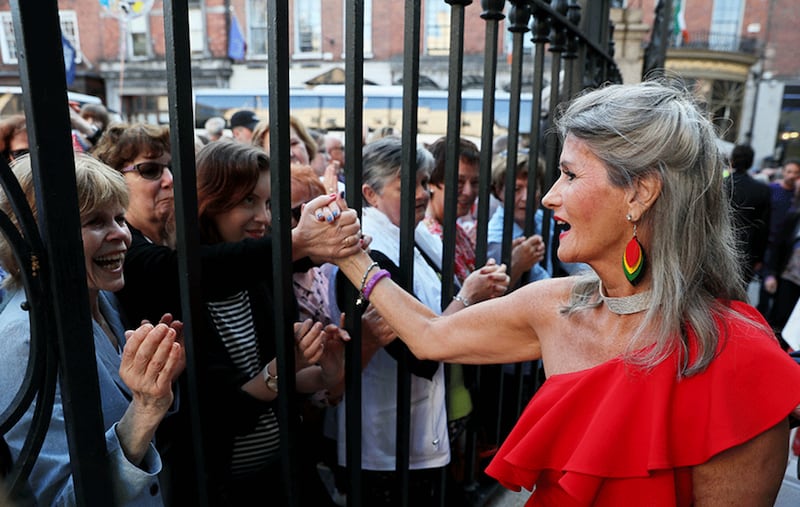
Picture by Brian Lawless/PA Wire Survivor of the Magdalene laundries Gabrielle O'Gorman (right) is greeted by members of the public as she arrives at the Mansion House in Dublin to attend a Gala dinner for survivors and their supporters.
Picture by Brian Lawless/PA Wire
Mary Smith was in tears as she told reporters she and her mother Eileen were both "locked up" in the laundries adding: "This has left me shattered for the rest of my life. I've come here for justice for the people who suffered."
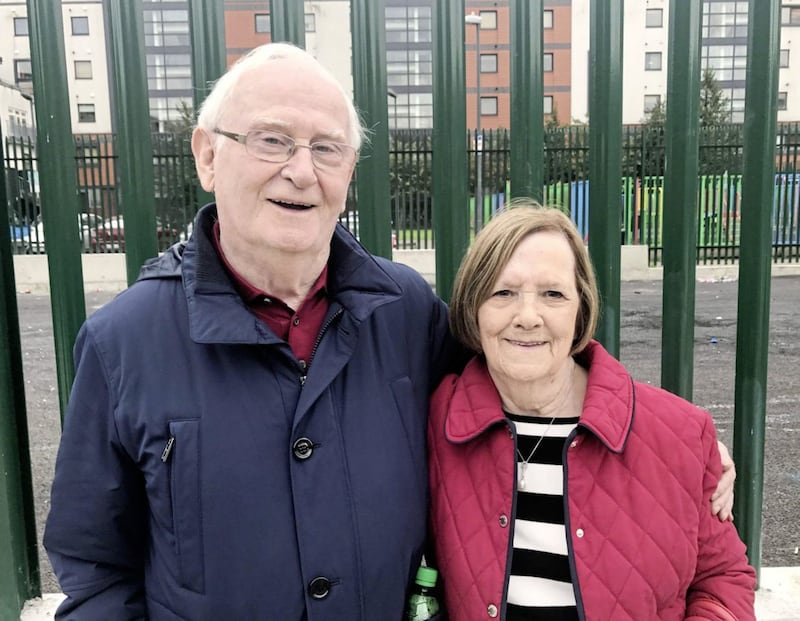
Mary Merritt, (87), who travelled from Tunbridge Wells, Kent, in England, said: "The Church has never apologised to us. Without the press, the stories would never have been told.
"We also have to remember the women who cannot be with us today and were buried in mass graves."
The #MagdaleneLadies were completely overwhelmed but completely delighted by the welcome, the warmth, the sincerity of ordinary #Dubliners who came out in their hundreds to #DublinHonoursMagdalenes pic.twitter.com/7u8baXif0m
— Susan Lohan (@susanlohan) June 5, 2018
Campaigner Norah Casey said: "This event is not about celebration, it's about dignity and respect."
In his speech President Higgins said: "A combination of stigma, shame and an unreceptive society condemned so many women to concealing their experiences, their trauma, their hurt.
"In recent years the silence has been broken and you all have helped to let the light into some very dark corners of Ireland's shared past.
"You have presented us with what makes a very harrowing and deeply uncomfortable reflection of an Ireland some would prefer not to be able to recognise, but which has to be acknowledged, transacted and to which a response must be made.
“Today, here in Áras an Uachtaráin as President of Ireland, mar Uachtarán na hÉireann, I apologise to you - the survivors of the Magdalene regime.”https://t.co/z9ZH5HHE5q pic.twitter.com/8aE5UyDfkR
— President of Ireland (@PresidentIRL) June 5, 2018
"All of you and of all the other women who cannot be with us today were failed by these institutions and the religious orders who ran them.
"You were profoundly failed by the State which, in its relationship to these institutions, should have had your welfare at its core.
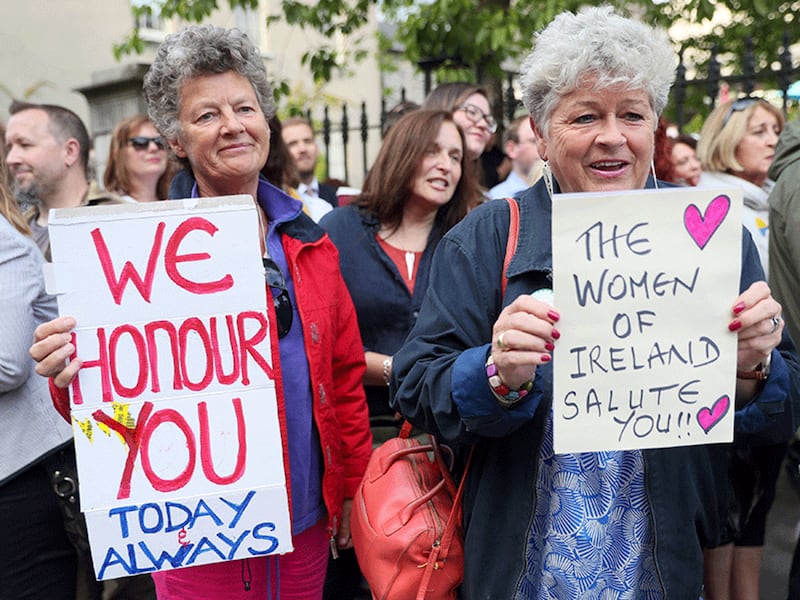
"You were failed by governments that knowingly relied on the existence and practices of these institutions rather than addressing your particular needs in other, more sympathetic ways.
"You were also failed by a society that actively colluded by their silence in your incarceration and treatment or chose to look the other way, averted their gaze, as vulnerable girls and women were subjected, in so many cases, to further abuse and degradation.
"Ireland failed you. When you were vulnerable and in need of the support of Irish society and its institutions, its authorities did not cherish you, protect you, respect your dignity or meet your needs and so many in the wider society colluded with all that through their silence."
After the speech the women were taken to Mansion House, the residence of the Lord Mayor of Dublin. Gardaí closed off the street as crowds lined the pavements and there were moving scenes as they applauded and cheered the group upon their arrival.
On Wednesday the women will discuss how they would like to be memorialised by the state in private meetings in the culmination of the two-day event organised by voluntary group Dublin Honours Magdalenes (DHM).
The Department of Justice and Equality is understood to have paid for flights and hotels for the women who travelled from Britain, Switzerland, Australia and the US.
At the Mansion House in Dublin, welcomed by cheering crowds and homemade signs reading "the women of Ireland salute you" and "welcome home" #DublinHonoursMagdalenes pic.twitter.com/6TRYZlfIAR
— Caelainn Hogan (@CaelainnH) June 5, 2018
Many were returning to Ireland for the first time since leaving the laundries, DHM said.
The events come as the government's redress scheme was widened to reach women originally excluded because they worked in the laundries but lived elsewhere.
On Monday, academics in the north said their year-long government-commissioned probe into records of mother and baby homes and Magdalene laundries north of the border could help determine whether a public inquiry into the treatment of residents there will take place.
